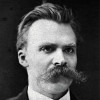“ The wise man will try to live unnoticed, so as to have no enemies.Sexual love, as one of the most “dynamic” of pleasures, naturally comes under the ban. “Sexual intercourse,” the philosopher declares, “has never done a man good and he is lucky if it has not harmed him.” ”
Bertrand Russell, A History of Western Philosophy (1945). copy citation
| Author | Bertrand Russell |
|---|---|
| Source | A History of Western Philosophy |
| Topic | pleasure love |
| Date | 1945 |
| Language | English |
| Reference | |
| Note | |
| Weblink | http://www.ntslibrary.com/PDF%20Books/History%20of%20Western%20Philosoph... |
Context
“It was a natural consequence of his principles that he advised abstinence from public life, for in proportion as a man achieves power he increases the number of those who envy him and therefore wish to do him injury. Even if he escapes outward misfortune, peace of mind is impossible in such a situation. The wise man will try to live unnoticed, so as to have no enemies.
Sexual love, as one of the most “dynamic” of pleasures, naturally comes under the ban. “Sexual intercourse,” the philosopher declares, “has never done a man good and he is lucky if it has not harmed him.” He was fond of children (other people’s) , but for the gratification of this taste he seems to have relied upon other people not to follow his advice. He seems, in fact, to have liked children against his better judgement;”
source


